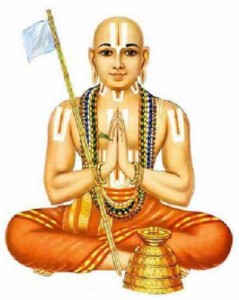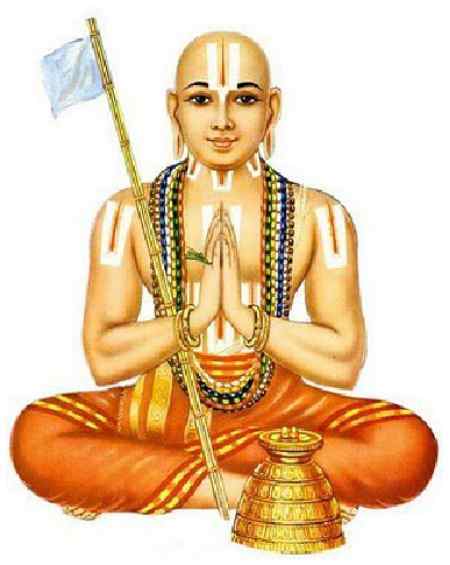
Ramanuja is the leading dualistic philosopher of later India, whom all the other dualistic sects have followed, directly or indirectly, both in the substance of their teaching and in the organization of their sects even down to some of the most minute points of their organization. You will be astonished if you compare Ramanuja and his work with the other dualistic Vaishnava sects in India to see how much they resemble each other in organization, teaching and method.
I will take Ramanuja as the typical dualist of India, the great modern representative of the dualistic system. According to Ramanuja, these three entities are eternal — God, and soul, and nature. The souls are eternal, and they will remain eternally existing, individualized through eternity, and will retain their individuality all through. Your soul will be different from my soul through all eternity, says Ramanuja, and so will this nature — which is an existing fact, as much a fact as the existence of soul or the existence of God — remain always different.
And God is interpenetrating, the essence of the soul, He is the Antaryâmin. In this sense Ramanuja sometimes thinks that God is one with the soul, the essence of the soul, and these souls — at the time of Pralaya, when the whole of nature becomes what he calls Sankuchita, contracted — become contracted and minute and remain so for a time. And at the beginning of the next cycle they all come out, according to their past Karma, and undergo the effect of that Karma.
Every action that makes the natural inborn purity and perfection of the soul get contracted is a bad action, and every action that makes it come out and expand itself is a good action, says Ramanuja. Whatever helps to make the Vikâsha of the soul is good, and whatever makes it Sankuchita is bad. And thus the soul is going on, expanding or contracting in its actions, till through the grace of God comes salvation. And that grace comes to all souls, says Ramanuja, that are pure and struggle for that grace.
Ramanuja says, “So long as you think you are a body, and you think you are a mind, and you think you are a Jiva, every act of perception will give you the three — Soul, and nature, and something as causing both.” But yet, at the same time, even the idea of the body disappears where the mind itself becomes finer and finer, till it has almost disappeared when all the different things that make us fear, make us weak, and bind us down to this body-life have disappeared.
Ramanuja attributes consciousness to God. Ramanuja declares that God is the essence of conscious knowledge. Undifferentiated consciousness, when differentiated, becomes the world.
Ramanuja on the other hand, with a most practical philosophy, a great appeal to the emotions, an entire denial of birthrights before spiritual attainments, and appeals through the popular tongue completely succeeded in bringing the masses back to the Vedic religion.
Ramanuja says, the Vedas are the holiest study. Let the sons of the three upper castes get the Sutra (The holy thread.) and at eight, ten, or eleven years of age begin the study, which means going to a Guru and learning the Vedas word for word, with perfect intonation and pronunciation.
Ramanuja’s theory is that the bound soul or Jiva has its perfections involved, entered, into itself. When this perfection again evolves, it becomes free.
Excerpted from Complete works of Swami Vivekananda. The 3035th birth anniversary of Sri Ramanujacharya is observed on April 24.
Swami Vivekananda







